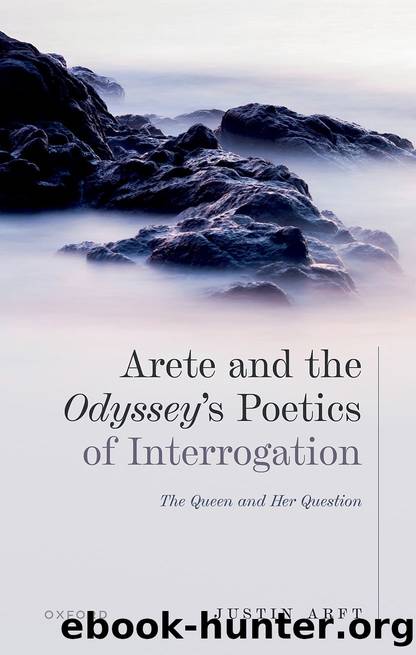Arete and the Odyssey's Poetics of Interrogation by Justin Arft

Author:Justin Arft [Arft, Justin]
Language: eng
Format: epub
ISBN: 9780197654934
Publisher: OUP Oxford
Published: 2022-07-30T00:00:00+00:00
Tell your name, the one that your mother and father used to call you there,
and the others who live in the city and around it.
For no man among men is entirely nameless,
lowly or high-born, after they are first born,
but parents put [a name] upon all men when they give birth to them.
This famous request brings the epicâs preoccupation with identity, naming, and namelessness to a head and initiates Odysseusâ expansive treatment of his past. It is not, however, a continuation of Areteâs failed interrogation but rather a provocation with which Odysseus must contend to establish his basis for kleos.74 Just as Alkinoos has interfered with the bond of suppliancy created by Arete, so he now attempts to usurp her interrogation as well, and he does so in the most irregular way possibleâhe presses on the one part of the strangerâs interrogation that is not typically isolated or even to be understood literally, the âwhoâ element, which he now invokes in an explicit request for Odysseusâ name. Further, Alkinoos forces the question of Odysseusâ identity in a way that no longer accommodates a performance of what the strangerâs interrogation elicitsâa transformative invocation of shared memories that allows Odysseusâ Odyssean kleos to be expressed. Rather than allowing for such an opening, Alkinoos now closes in, explicitly asking Odysseus to connect himself to the least private, most famous, and most painful aspect of his past, the very man who can be named in reference to the display of pain he has just witnessed. This attempt at identification is in many ways the opposite of what the poetics of interrogation achieves throughout the epic.
Alkinoosâ claim that âno man among men is entirely namelessâ strikes at the heart of Odysseusâ namelessness throughout the epic and deserves careful attention for its phraseological features as well. Not only will this claim be proven incorrect when Odysseus later recounts his own skillful use of anonymity to escape Polyphemus, but this exclusive claim fits the pattern of exclusionary pronominalization wherein Odysseus is the exception to the ruleâno man except Odysseus is nameless. Odysseus alone wears namelessness well, and a significant component of his mythological persona is characterized by his anonymity. More significantly, Alkinoosâ statement resembles but also strongly contrasts with Penelopeâs more accurate iteration of this negative claim (X is not possible; therefore tell me Y) when she likewise presses the strangerâs identity in Odyssey 19. When Penelope initially interrogates Odysseus, she uses the same couplet spoken by Arete (7.237â8), but with the Ithacan iteration in the last half of the strangerâs interrogation (19.104â5):
ξεá¿Î½Îµ, Ïὸ μÎν Ïε ÏÏῶÏον á¼Î³á½¼Î½ εἰÏήÏομαι αá½Ïή·
ÏÎ¯Ï ÏÏθεν Îµá¼°Ï á¼Î½Î´Ïῶν; ÏÏθι Ïοι ÏÏÎ»Î¹Ï á¼ Î´á½² Ïοκá¿ÎµÏ;
Download
This site does not store any files on its server. We only index and link to content provided by other sites. Please contact the content providers to delete copyright contents if any and email us, we'll remove relevant links or contents immediately.
Letters From a Stoic by Seneca(2790)
The Valmiki Ramayana: Vol. 1 by Bibek Debroy(2407)
The Valmiki Ramayana: Vol. 2 by Bibek Debroy(2267)
The Valmiki Ramayana: Vol. 3 by Bibek Debroy(2212)
Mary Boleyn by Alison Weir(1879)
The Greeks by H. D. F. Kitto(1743)
The Notebooks of Leonardo Da Vinci by Da Vinci Leonardo(1599)
The Classics by Mary Beard(1588)
Mythos (2019 Re-Issue) by Stephen Fry(1565)
The Voynich Manuscript by Gerry Kennedy(1471)
Medea and Other Plays by Euripides(1439)
Art of Living by Sellars John;(1424)
Annals by Tacitus(1406)
Hindoo Holiday by J. R. Ackerley(1374)
Claudius the God by Robert Graves(1287)
Appeasement of Radhika by Muddupalani(1278)
Atlantis the Lost Continent Finally Found by Arysio Santos(1249)
THE REPUBLIC by plato(1246)
Kadambari: Bana by Bana(1226)
